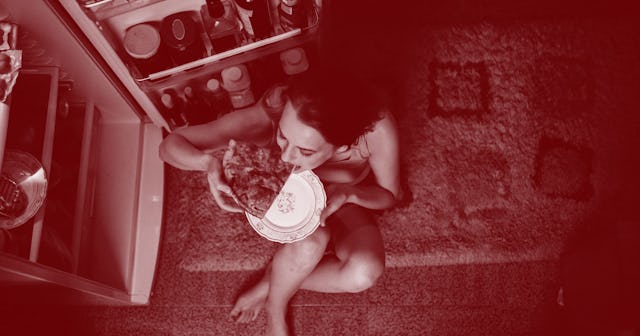I Have A Legit Food Addiction And It's Miserable

We’ve ordered pizza, and I’m cleaning up after dinner. I’ve just opened the trash can to toss a crumpled paper towel when I spot it: one of my kids has peeled the cheese off their slice — the best damn part, in my opinion. There it lies, at the top of the garbage can.
To everybody else, it looks like what it is. Garbage.
But to me, it looks delicious.
Don’t do it, my mind immediately admonishes. For starters, it’s someone else’s discarded cheese. I’m not even sure why they didn’t eat it; it could’ve been sneezed on or dropped or dog-licked, for all I know. More importantly, it’s in the fucking trash. Somewhere in my brain, the logical part of me cringes.
But that’s immediately overridden by a compulsion I know all too well, and here come the rationalizations. Things like, “We paid good money for that, it shouldn’t go to waste,” and “It’s just touching napkins, it’s not really up against the nasty trash.”
Before I know it, the cheese has found its way from the garbage into my mouth, and as I hastily chew, the guilt and bitter realization overpower all the flavor. I’m a 38-year-old woman, full from my own (fresh-from-the-pizza-box) dinner, who has just eaten something out of the trash. Not out of necessity or desperation, thank goodness, but because I literally cannot control my own impulses when it comes to food.
I’ll be the first to admit that scenarios like this are kinda funny, but it’s a symptom of a larger, uglier issue that I struggle with on a daily basis. Because I’m completely, hopelessly addicted to food.
Food addiction has been a long-debated topic. A 2013 study conducted by addiction expert Francesco Leri, Associate Professor of Neuroscience and Applied Cognitive Science at the University of Guelph indicated that high fructose corn syrup, which is found in many foods, can cause addiction-like behaviors. But some researchers argue that you can’t be addicted to food itself, that it’s an underlying condition — anxiety or depression or another mood disorder — and “food addiction” is simply a symptom of a larger problem.
But I know this much: whatever it is, whatever’s behind it, has me in a perpetual chokehold. And it’s miserable.
When my eyes open in the morning, my first thoughts are of food … namely, how much control is it going to have over me today? On a “good” day, when my self-discipline kicks in, I eat less. Not because I’m not tempted to eat — I still think about food every few minutes literally all day long — but because at that moment, for whatever reason, I have the ability to resist. Sometimes I don’t eat at all, to “make up for” the days when I’ve grossly overdone it.
I know that’s unhealthy, but I find that it’s easier to refrain altogether than to try to just eat a little bit. I know that once I put something in my mouth, it’s game over. Any self-control I’ve mastered that day will fly right out the window, and I’ll soon be digging elbow-deep into the fridge and berating myself for how weak my willpower is. I don’t purge; I’m not bulimic, though if I’m being honest, I’d have probably tried it if I didn’t have a deep-seated loathing for vomit. I just wallow in the guilt, my self-worth temporarily reduced to the number of calories I know I’ve just ingested.
Vedrana Sučić/Reshot
It’s so easy for someone who doesn’t understand this food-obsessed life to “helpfully” suggest that I try cutting back on portion sizes. For me, cutting down on portion sizes is eating three servings instead of six. And on bad days, portion control isn’t even an option. The thought of limiting my serving size literally makes me feel panicky and deprived before I even get started eating, as though someone has told me that single portion is all I’ll get to eat for the rest of the week.
You wouldn’t look at me and guess I have such an issue. I’m not substantially overweight. I may hang onto an extra ten or twelve pounds, but I’ve also got four kids, so that isn’t abnormal. I teach group fitness classes. Anybody who knows me knows that I’m a big eater, and people regularly express surprise at how much I can put away in one sitting. But they don’t know the half of it.
I’ve tried everything to keep food from ruling my life. Every trick in the book. I’ve downed my weight in freaking ice water to “keep myself full” (HA HA HA). I’ve taken appetite suppressants, tantamount to legal speed, which suppress nothing but my ability to sit still without jittering. I’ve tried keeping only healthier foods on hand, but I’ll inhale an entire bag of turkey jerky or mini rice cakes as readily as I’ll inhale a bag of chips. I’ve tried eating slowly to give my brain time to register when I’ve had enough. I’ve tried eating mindfully, focusing intently on the taste and texture and aroma of my food. But instead of making me feel more satisfied, I’m not satisfied until I have more.
It’s an endless loop of disordered eating. And I’m stuck, despite my best efforts.
You can’t quit food, the way you can quit smoking cigarettes or drinking caffeine. So what am I supposed to do when the very thing keeping me oppressed is also the thing keeping me alive?
This article was originally published on